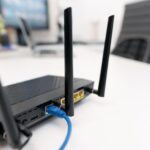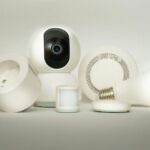Smart home cameras have become indispensable tools, providing peace of mind by monitoring your property both inside and out, even when you’re away. However, these devices come with significant privacy concerns that every user should be aware of.
The Privacy Dilemma of Smart Home Cameras
A recent study by Surfshark has brought to light alarming findings regarding the data collection practices of outdoor security camera applications. These apps are among the worst offenders, collecting an average of 12 data points per user. This includes highly sensitive information such as email addresses, phone numbers, payment details, and precise geolocation. This volume of data collection is 50% higher than what is typically gathered by other smart home devices, and it is particularly concerning that many of these apps link up to seven data points directly to individual identities.
Indoor security camera applications, while slightly less aggressive, also raise significant privacy flags. On average, they collect nine data points, with six frequently tied to users’ identities. Commonly harvested data includes email addresses, phone numbers, user IDs, device IDs, purchase histories, and even audio recordings. While this information can enhance user experience, it simultaneously heightens the risk of privacy infringements.
Data Collection Practices of Popular Camera Apps
A significant concern with both indoor and outdoor security camera apps is the type of data being collected. Many of these applications collect personal information such as your name, email, phone number, and physical address. Notably, some apps like Arlo, Deep Sentinel, and D-Link even access data about your contacts, which can be exploited outside of the app’s intended use. This level of data access goes beyond what is necessary for the apps to function effectively.
Among the most data-hungry applications, Deep Sentinel and Lorex lead the pack for outdoor cameras, each collecting 18 out of 32 possible data points. For indoor cameras, Nest Labs tops the list with 17 data points collected, while Ring and Arlo each gather 15.
Lack of Regulations Poses Major Risks
The absence of comprehensive regulations and standards for smart home devices exacerbates privacy concerns. Without robust guidelines, users are left vulnerable to data breaches, cyberattacks, and even potential physical threats. Some applications engage in user tracking for targeted advertising purposes or share data with third parties and data brokers. While outdoor cameras typically refrain from tracking users, indoor cameras like Nooie and Canary Connect often do, complicating privacy matters further.
Taking Control of Your Privacy: Essential Tips
To safeguard your personal information and enhance your privacy while using smart home cameras, consider the following strategies:
1. **Limit Data Sharing:** Look for apps that allow you to control data-sharing settings. Disabling features like location tracking and audio recording can significantly reduce the risk of exposing sensitive information.
2. **Regularly Review Privacy Settings:** With frequent software updates, privacy settings may change. Ensure that your app’s settings align with your preferences and disable non-essential features.
3. **Utilize Strong Passwords and Two-Factor Authentication (2FA):** Protect your camera app and associated accounts with strong, unique passwords. A password manager can assist in generating and storing complex passwords.
4. **Be Mindful of Camera Placement:** Avoid positioning cameras in private areas such as bedrooms or bathrooms to minimize the risk of capturing sensitive data.
5. **Consider Local Storage Options:** Opt for cameras that offer local storage, ensuring footage is stored on a device like a hard drive or SD card instead of the cloud, which can be more vulnerable to breaches.
6. **Use a VPN:** Encrypt your internet connection with a Virtual Private Network (VPN) to add an extra layer of security. This helps protect data transmitted between your smart home devices and the internet.
7. **Stay Informed:** Regularly review privacy policies to understand how your devices collect, store, and share data. Be aware of any changes that may affect your personal information.
8. **Evaluate Home Security Systems:** When considering security systems, be aware that they also collect various user data. Adjust settings to minimize privacy risks wherever possible.
The Landscape of Smart Home Technology: A Double-Edged Sword
The rapid growth of Internet of Things (IoT) technology has transformed our lives, but the lack of regulatory oversight raises significant concerns about user safety. Many smart home cameras collect more data than necessary, often without clear explanations about how that data is used. This could lead to personal information being sold to third parties or used for targeted advertising.
Is your smart home camera collecting more data than you’re comfortable with? Share your thoughts and experiences with us.
For more expert tips and security updates, consider subscribing to the CyberGuy Report Newsletter. Join the conversation and stay informed about the latest in tech security.










